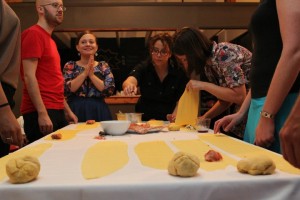We Ask, They Answer: Q&A with Dabble co-founder Erin Hopmann

One of the masterminds behind the wildly successful Dabble.co chats about tapping into your intuition, sushi-making classes and meeting new people
By Taylor Tolbert
Ever had the urge on a Wednesday night to learn how to hand print fabric? Or start a fashion blog but don’t know how to begin? Or maybe just take a simple sushi-making class? You’d probably never think you could sign up for all of these classes in the same place. But that would mean you’ve never heard of Dabble (www.Dabble.co).
Started in May 2011 by Erin Hopmann and Jessica Lybeck, Dabble is a website that  provides lifelong students the opportunity to “dabble” in any interest at any time. It doesn’t cost a lot of money or take a lot of your time, and it’s a commitment that can be as long or short as you wish. Classes start at only $10 and range in subject from ballroom dancing to woodworking to life coaching.
provides lifelong students the opportunity to “dabble” in any interest at any time. It doesn’t cost a lot of money or take a lot of your time, and it’s a commitment that can be as long or short as you wish. Classes start at only $10 and range in subject from ballroom dancing to woodworking to life coaching.
Dabble offers a fun way to explore your interests without subscribing to the belief that all students should silently listen from behind desks. Classes are held nearly anywhere, in parks or businesses that have volunteered their space to Dabble.
I had the chance to chat with Hopmann to get a feel for the company and the idea. After talking a little bit about San Francisco (Hopmann just relocated there to launch Dabble on the West Coast, and I just moved to Chicago from the Bay Area), I jumped right in for some background on the company.
Q: How did the idea of Dabble start?
A: It was born from the pain point that we both shared. Here we were, adults out of formal education, but we still had the desire to take classes from time to time more along the lines of hobbies. It felt like every time we wanted to itch the scratch, we had to sign up for 12-week classes that cost $500. It was always a relatively big commitment. I was interested in getting back into art, which I used to be really into. I signed up for a print making class, but work ended up being really hectic at the time and I missed half the classes. Here I was giving up $500 and we were like, “Why can’t you just dabble in your interests here and there?” We launched in May, so we’re coming up on our two-year anniversary, and we really realized there’s a big opportunity for teaching. There’s really a hobbyist mentality — maybe you’re a journalist as a career, but you knit well on the side. You can teach a knitting class on a regular basis and bring in some extra income while having fun connecting with people. There’s also a more professional side for teachers who use Dabble as a kind of marketing forum. So that’s kind of the bird’s eye view of it all.
making class, but work ended up being really hectic at the time and I missed half the classes. Here I was giving up $500 and we were like, “Why can’t you just dabble in your interests here and there?” We launched in May, so we’re coming up on our two-year anniversary, and we really realized there’s a big opportunity for teaching. There’s really a hobbyist mentality — maybe you’re a journalist as a career, but you knit well on the side. You can teach a knitting class on a regular basis and bring in some extra income while having fun connecting with people. There’s also a more professional side for teachers who use Dabble as a kind of marketing forum. So that’s kind of the bird’s eye view of it all.
Q: For people my age, I’m in college so there are so many things that I want to try, but do I really want to spend $3,000 and 12 weeks of my time taking a class in school while I have everything else going on. It’s great that the Dabble classes offer people a chance to just try things out from time to time or pick up their old hobbies.
A: I think it’s recognizing that people, more and more today, have a lot of varied interests and access to that all, but we also are a little more ADD in the culture we live in, so it’s nice.
Q: For teachers, when you get people wanting to teach classes, what’s the application or screening process like?
A: It’s funny, this is probably the most common question we get. The submission process happens all online. It’s really self-explanatory, and we’ll help you along. We’ll tell you how to best write up a class description, and as far as vetting  teachers, we don’t ask for certification or credentials. We ask for a biography that mentions the points that make you qualified and able to teach what you want to teach. On occasion, we get a red flag raised, but for the most part, people don’t want to get up in front of a class and embarrass themselves, so it works. Everything comes through us before it actually goes live, but the point here is to empower people to be teachers even if they’ve never taught before. We don’t want to put up all of these roadblocks for people who have the desire to teach. On the back end of things, we get reviews after classes happen, so if the class is poorly reviewed, which does not happen often at all, we’ll reexamine whether we want the teacher to be able to teach again.
teachers, we don’t ask for certification or credentials. We ask for a biography that mentions the points that make you qualified and able to teach what you want to teach. On occasion, we get a red flag raised, but for the most part, people don’t want to get up in front of a class and embarrass themselves, so it works. Everything comes through us before it actually goes live, but the point here is to empower people to be teachers even if they’ve never taught before. We don’t want to put up all of these roadblocks for people who have the desire to teach. On the back end of things, we get reviews after classes happen, so if the class is poorly reviewed, which does not happen often at all, we’ll reexamine whether we want the teacher to be able to teach again.
Q: Do you notice that you have a lot of recurring teachers?
A: We do. About half our teachers have taught more than one class, and a big chunk of those have taught five or more classes. We have a number of teachers who are teaching on a monthly or bi-monthly basis.
Q: It seems like a lot of the reviews are very positive for the teachers, and all of those classes fill up quickly. Is it easy to get the venues to host these classes? Are businesses quick to volunteer their services?
A: You know, we do. We sort of made it a point to source a lot of local venues that were willing to host classes in the early days because, again, the bottom line is we’re empowering people to become teachers, and even if you didn’t have a space to teach, we wanted to help you with that. We have over 600 venues in our database, but we take less of a cut of each ticket now to try to get teachers to find their own venues.
Q: What have you noticed are the most popular types of classes in Chicago?
A: You’d think this would be an easy question to answer, but it really varies. Culinary and arts classes tend to do very well, but then just as soon as we think a class won’t sell well, it goes gangbusters. For example, “Tapping Into Your Intuition 101.” Cooking classes sell  really well because you’re getting a really good bargain. Even business classes have been doing well. I think the cool thing now is that there are a lot of unusual classes that you can’t find anywhere else. People are experimenting with not only what to dabble in, but teachers also use us as a platform to see if what they’re interested in teaching is going to work well. “Dr. Who 101” and things like that end up selling well! And then people have fun with that.
really well because you’re getting a really good bargain. Even business classes have been doing well. I think the cool thing now is that there are a lot of unusual classes that you can’t find anywhere else. People are experimenting with not only what to dabble in, but teachers also use us as a platform to see if what they’re interested in teaching is going to work well. “Dr. Who 101” and things like that end up selling well! And then people have fun with that.
Q: What’s the strangest proposition for a class that you’ve gotten? Any that you just absolutely couldn’t put through to the site?
A: We’ve had some classes like “How to Become an Ordained Minister” that are just really niche that we just don’t think will sell well or go with the brand that we have. We often try to experiment, though. We’re live in Denver, and we actually have a class on how to grow marijuana. We had to wonder if it was OK to post that, but it’s going over pretty well.
Q: Oh wow! That would go over well in San Francisco, too, I’m sure. Are you looking to expand to a lot of major cities in the U.S.?
A: Definitely. We’re working on plans now, and we have 40 cities outside of the ones we’re currently in indicating interest in Dabble and submitting classes. So it’s just a little frustrating because we don’t necessarily have the resources to support it all, but the technology is there. So we’re trying to figure out how to balance both sides and make sure that we can sell out the five classes that we have in Portland.
Q: Have you noticed that you’re getting a variation of classes in the different cities just based on the unique culture and interests of each city?
A: Yeah, we certainly want to be as hyper local as we can, to show that we recognize differences in cities and markets. So far there hasn’t been a huge difference. For example,  classes in Denver on barefoot running and mountain climbing are maybe more Denver than Chicago, but so far in San Francisco, all of the classes could also be held in Chicago.
classes in Denver on barefoot running and mountain climbing are maybe more Denver than Chicago, but so far in San Francisco, all of the classes could also be held in Chicago.
Q: If you had to teach a class, what would you teach?
A: [laughs] You know, the team gives me a lot of flak because I haven’t actually taught a class yet.
Q: Have most of your team taught classes?
A: About half have, yes. … I think maybe I’d teach something about business. How to launch a start-up? We launched Dabble on WordPress 10 weeks after we had the idea, but part of me wants to teach something that doesn’t relate to the business and kind of have fun with going outside of that.
Q: I feel like you’ve given a great overview, but is there anything else you want to say about Dabble?
A: The one thing that we’re trying to do is build a community. We’ve resisted doing online classes, and we don’t quite check the box on just a pure education company because we want to have fun events where people are meeting people either for dating purposes or just to meet new people in a new city. We’re getting a lot of warm fuzzies in terms of the feedback from people. We’ve resisted some outside capital because we’re trying to grow this the way that we want to and make sure that we serve the needs of the people first. We feel pretty strongly about that.
Visit www.Dabble.co for more information on Chicago classes.









